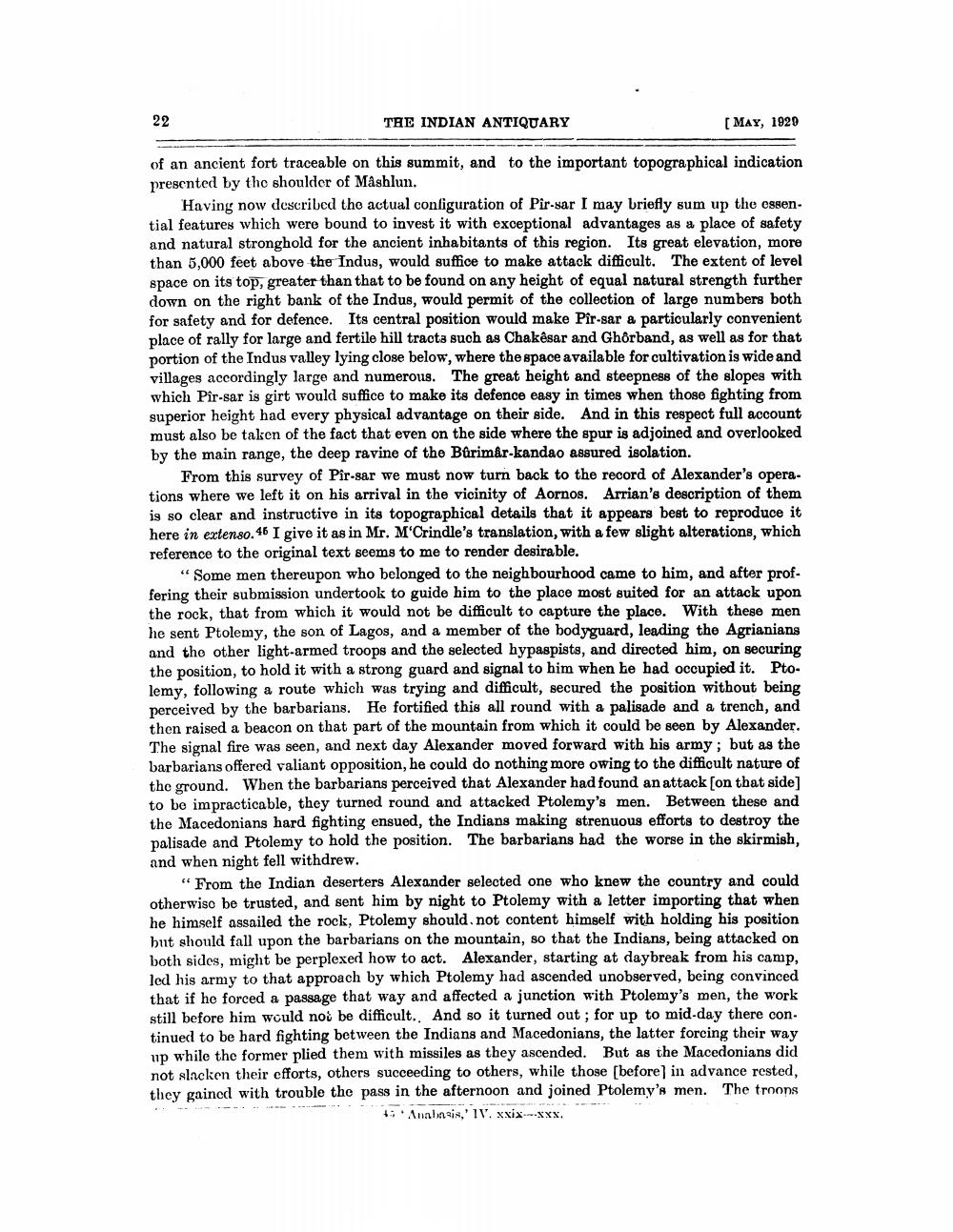________________
22
THE INDIAN ANTIQUARY
[MAY, 1920
of an ancient fort traceable on this summit, and to the important topographical indication presented by the shoulder of Mashlun.
Having now described the actual configuration of Pir-sar I may briefly sum up the essential features which were bound to invest it with exceptional advantages as a place of safety and natural stronghold for the ancient inhabitants of this region. Its great elevation, more than 5,000 feet above the Indus, would suffice to make attack difficult. The extent of level space on its top, greater than that to be found on any height of equal natural strength further down on the right bank of the Indus, would permit of the collection of large numbers both for safety and for defence. Its central position would make Pir-sar a particularly convenient place of rally for large and fertile hill tracta such as Chakêsar and Ghörband, as well as for that portion of the Indus valley lying close below, where the space available for cultivation is wide and villages accordingly large and numerous. The great height and steepness of the slopes with which Pir-sar is girt would suffice to make its defence easy in times when those fighting from superior height had every physical advantage on their side. And in this respect full account must also be taken of the fact that even on the side where the spur is adjoined and overlooked by the main range, the deep ravine of the Birimêr-kandao assured isolation.
From this survey of Pir-sar we must now turn back to the record of Alexander's operations where we left it on his arrival in the vicinity of Aornos. Arrian's description of them is so clear and instructive in its topographical details that it appears best to reproduce it here in extenso. 46 I give it as in Mr. M'Crindle's translation, with a few slight alterations, which reference to the original text seems to me to render desirable.
"Some men thereupon who belonged to the neighbourhood came to him, and after proffering their submission undertook to guide him to the place most suited for an attack upon the rock, that from which it would not be difficult to capture the place. With these men he sent Ptolemy, the son of Lagos, and a member of the bodyguard, leading the Agrianians and the other light-armed troops and the selected hypaspists, and directed him, on securing the position, to hold it with a strong guard and signal to him when he had occupied it. Ptolemy, following a route which was trying and difficult, secured the position without being perceived by the barbarians. He fortified this all round with a palisade and a trench, and then raised a beacon on that part of the mountain from which it could be seen by Alexander. The signal fire was seen, and next day Alexander moved forward with his army; but as the barbarians offered valiant opposition, he could do nothing more owing to the difficult nature of the ground. When the barbarians perceived that Alexander had found an attack [on that side) to be impracticable, they turned round and attacked Ptolemy's men. Between these and the Macedonians hard fighting ensued, the Indians making strenuous efforts to destroy the palisade and Ptolemy to hold the position. The barbarians had the worse in the skirmish, and when night fell withdrew.
From the Indian deserters Alexander selected one who knew the country and could otherwiso be trusted, and sent him by night to Ptolemy with a letter importing that when he himself assailed the rock, Ptolemy should not content himself with holding his position but should fall upon the barbarians on the mountain, so that the Indians, being attacked on both sides, might be perplexed how to act. Alexander, starting at daybreak from his camp, led his army to that approach by which Ptolemy had ascended unobserved, being convinced that if he forced a passage that way and affected a junction with Ptolemy's men, the work still before him would noi be difficult. And so it turned out ; for up to mid-day there con. tinued to be hard fighting between the Indians and Macedonians, the latter forcing their way up while the former plied them with missiles as they ascended. But as the Macedonians did not slacken their efforts, others succeeding to others, while those [before in advance rested, they gained with trouble the pass in the afternoon and joined Ptolemy's men. The troons
Hi Anabasis,' IV. xxix---XXX,




